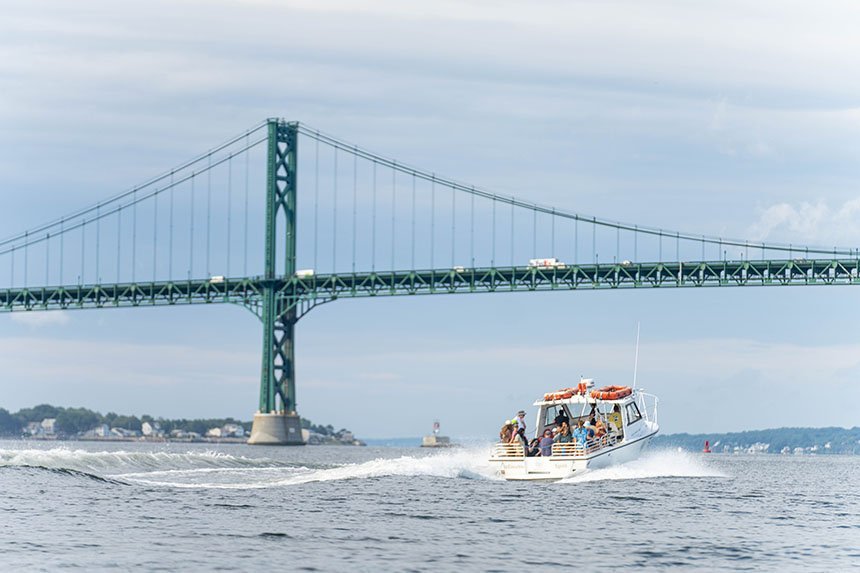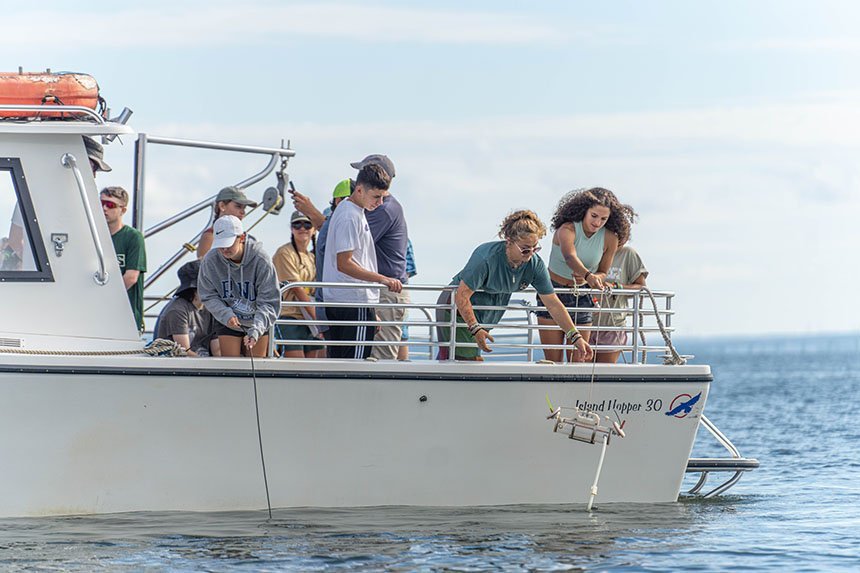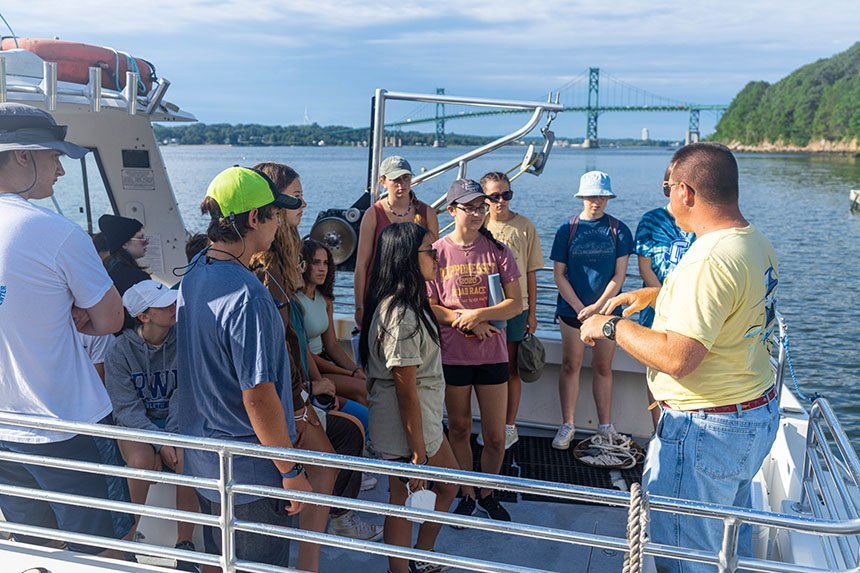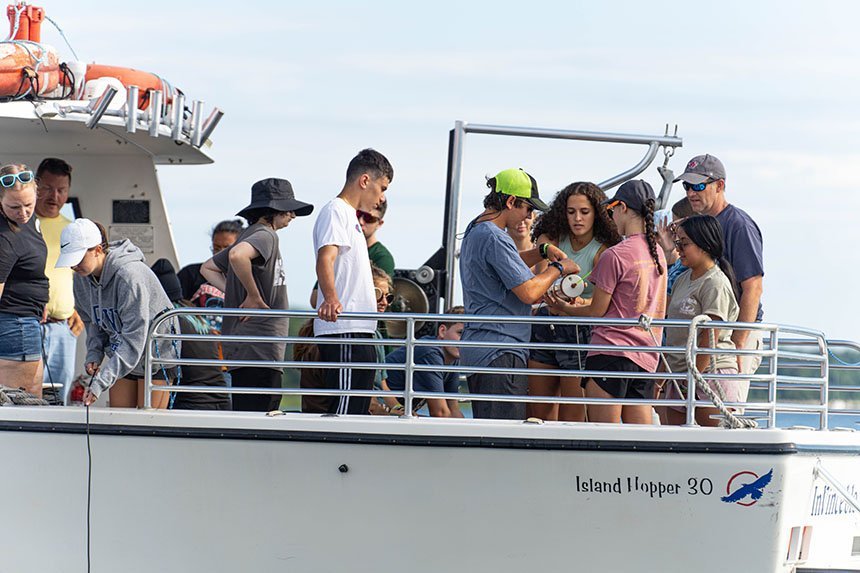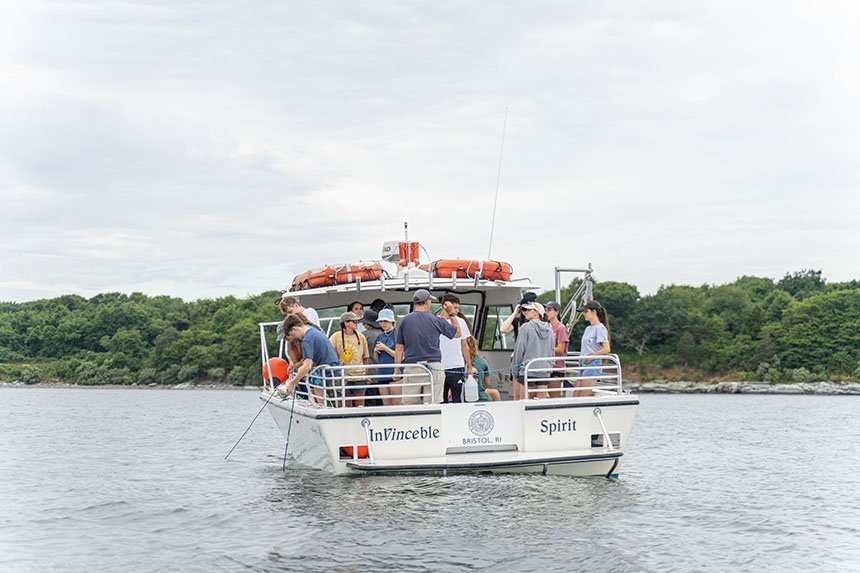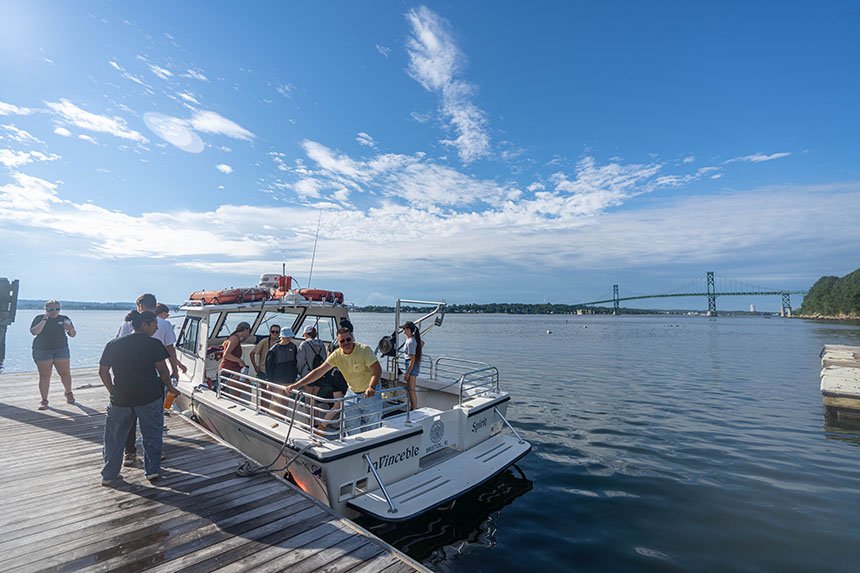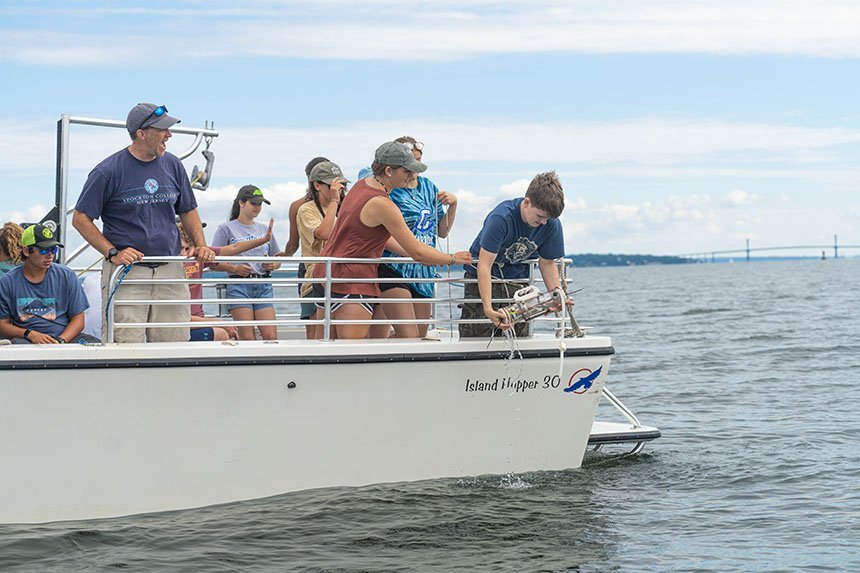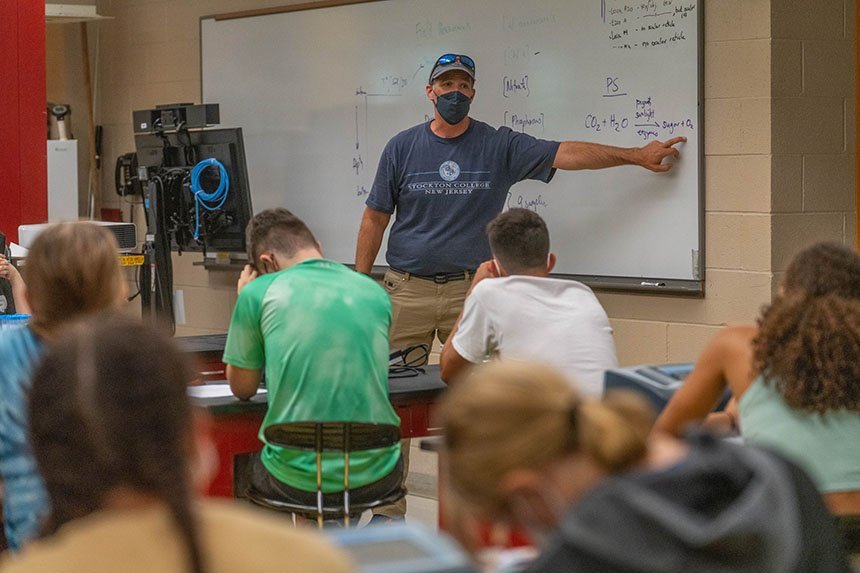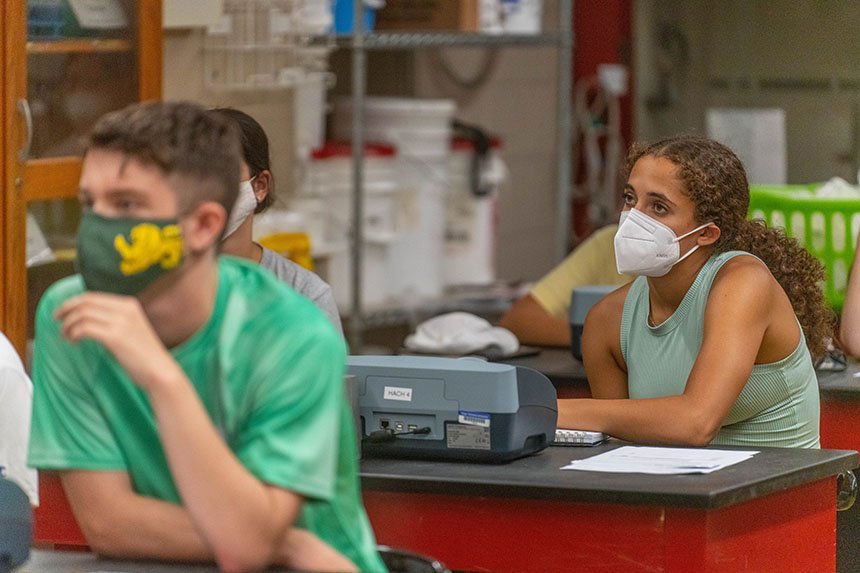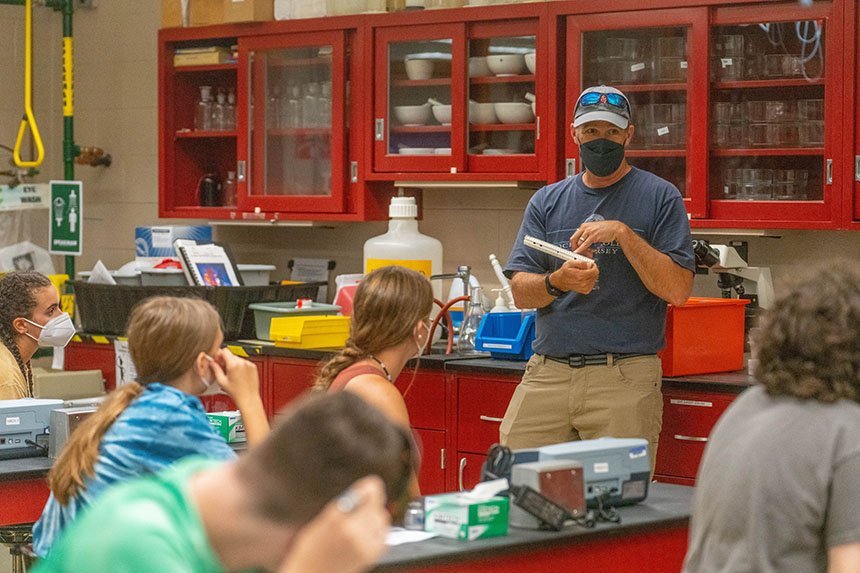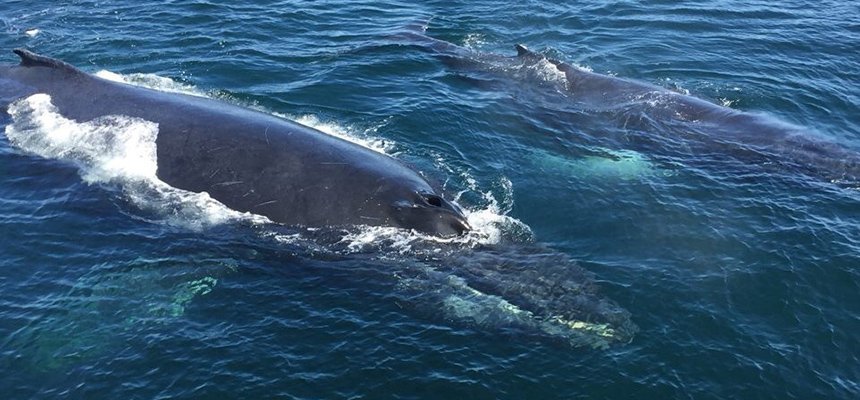
Marine Biology Camp
Our classrooms are the dynamic, thriving marine environments of the southern New England coast. Summer Marine Biology Camp students will learn about coastal ecosystems, food webs, productivity of the sea, plants and animals in the coastal zone, current events in marine biology and much more.
Program Highlights
The program includes lodging, meals, instruction, materials, use of laboratories, equipment and field trips.
Field excursions unlock the excitement and fun of marine biology:
- Learn oceanographic sampling techniques
- Explore bay ecosystems by sea kayak
- Snorkel along barrier beaches and tidal pools
- View whales during a boat trip off Cape Cod
- Identify marine organisms
- Daily opportunity to be in or on the water
Field trips are complemented by challenging laboratory demonstrations and experiments. Typical topics include:
- Plankton sampling and observation
- Shellfish and finfish, and seaweed biology and ecology
- Nutrient and productivity measures
- Aquaculture
Recognized experts will present guest seminars on current topics in marine biology. Previous presentations have included:
- Marine mammal protection
- Invasive species
- Overfishing
- Toxic plankton blooms
- Aquaculture
- Seaweed identification and uses
Eligibility and Application Procedures
High school students aged 15-17 with an interest in the aquatic sciences are welcome to apply to the program. Each session is led by a Faculty or Staff Director, three Resident Assistants that reside in the dorms with the participants, and RWU guest scientists who accompany and lead field or laboratory activities throughout the camp. Guest lectures are led by RWU scientists and program staff. The cost of the program is $1,995, which includes lodging, meals, instruction, materials, use of laboratories, equipment and field trips.
Cost
Cost: $1995
A $500 deposit, refundable through April 1, is due with the application. 50% of the registration balance ($747.50) is due by May and June 1.
Registration
Registration is open!
Please note that we recommend Covid-19 vaccination for camp participation. Health forms are currently being updated and will be emailed to registrants once they are available.
2025 Dates
Session 1 - July 6, 2025 to July 12, 2025
Session 2 - July 13, 2025 to July 19, 2025 (only 9 seats available)
Session 3 - July 20, 2025 to July 26, 2025 (only 9 seats available)
Session 4 - July 27, 2025 to Aug. 2, 2025
Session 5 - Aug. 3, 2025 to Aug. 9, 2025
*Please note RWU is partnering with a high school in Greece so we expect participation from international students from July 13 to 25.
Facilities
The Rhode Island coast is an outstanding location for marine science education. Within a short boat ride or drive are perhaps the best examples of rocky intertidal, tidal pool, salt pond and barrier beach habitats on the US east coast.
The Summer Marine Biology Field Studies Program uses the state-of-the-art teaching and research facilities of the Marine and Natural Sciences Building. Students will conduct laboratory studies in a modern 3000 sq. ft. wet lab with flowing seawater. A Learning Platform that extends 200 ft. into Mt. Hope Bay supports many other program activities. Research vessels are available for field explorations and sampling.
Summer Field Program students reside, double occupancy, in a contemporary, waterside residence hall. Meals are served in our modern, campus dining center. Recreation facilities are available for after-hours relaxation.
Faculty and Staff
Individual attention from RWU faculty and staff are a hallmark of our program. Enrollment is limited to 18 per session, ensuring each student is fully challenged.
Outstanding current Roger Williams University marine biology students serve as Resident Staff. Students are supervised 24 hours per day.
About Roger Williams University
The scenic, 140 acre waterfront campus is located in the historic seaport town of Bristol, Rhode Island. Roger Williams University offers a wide range of liberal arts majors including an exceptional program in Marine Biology and professional programs in architecture, business, education, engineering, historic preservation, justice studies and law.
Athletic options, numerous clubs and organizations, and community-enrichment opportunities enhance the experiences of students who come to the University from across the country and throughout the world to explore, learn and to succeed.
Questions
If you have questions after reviewing the FAQ, please contact Mr. Michael F. Wright, MBIO Camp Administrative Assistant, mfwright@rwu.edu; (401-254-3653).
FAQ
Who SHOULD apply to Marine Biology Camp?
This camp is an excellent fit for curious students that enjoy science, those who may be interested in studying marine science in college, and students who enjoy being in and on the water and discovering what’s in it. Marine Biology camp at RWU is an engaging experience designed to expose high school students to the bounty and variety of marine life in and around RI, by learning standard sampling and observation methods in oceanography and marine biology. Students will participate in field and laboratory activities that are similar in scope to learning activities of first year college students majoring in Marine Biology at RWU. On most days, there are field and/or laboratory activities in the morning and afternoon (with breaks for meals), which are followed by guest lectures from RWU's expert marine scientists.
Who SHOULD NOT apply to Marine Biology Camp?
This camp is not a good fit for students that are uneasy around the water or that do not have a genuine interest in science, or marine biology more specifically.
Please note campers sometimes report that, “My parents made me do this.” and for those students, Marine Biology camp rarely resonates in the ways that parents might be hoping. Please consider the interest of your child before signing them up for this camp; if they are not interested, please refrain from taking the space of another camper with genuine interest, and for creating an avoidably challenging situation that impacts the experience of other campers.
If you have questions or your child is uncertain, please talk to Brian Wysor, former MBIO Camp Faculty Director and Interim Dean of the School of School of Social & Natural Sciences @ RWU (bwysor@rwu.edu; 401-254-3014) because this camp is a great way to evaluate interests in the field of marine biology, and of course we hope it inspires students to pursue their passions and curiosities.
Can you help my camper get to RWU from the airport?
No. RWU does not provide support for travel to/from the airport and cannot house students outside of the specific dates of the camp for which they are registered. Note, most parents/guardians drop off their camper themselves. A waiver is required if your child will arrive or depart without a parent/guardian.
Are international students eligible to participate?
RWU does not restrict this experience to American Citizens, but we recognize that the coordination of travel for international participants is more complicated than that of participants arriving by car. RWU does not provide support for travel to/from the airport and cannot house students outside of the specific dates of the camp for which they are registered. With the understanding that the RWU Marine Biology program supports campers only for the duration of the camp and not at any time leading up to the start or any time after the official end of the camp, your application is welcomed.
What happens if a camper tests positive for COVID?
We are realistic about the possibility that COVID could impact camp experiences and while we are confident that we can offer a safe and fulfilling experience, we will be transparent about changes that are driven by COVID or other health and safety concerns.
My 14-year old child will be entering the 9th grade in the Fall. Are they eligible to participate in the high school marine biology camp this year?
Marine Biology camp is designed for High School Students, which can include rising 9th graders. Over the years we have had many rising 9th grade participants, but we have also observed that they can sometimes feel a little young, given that most participants are rising sophomores, juniors and seniors. We think having high school perspective is useful to campers, and they may find more value in the experience after having had a high school science course, or as they are starting to consider options for college.
Marine Biology Camp 2022
Resources
Need transportation for your student from/to airport? Below are some local car services.
Fairview Transport - 401-338-6968
East Bay Transportation - 401-787-1289
Anytime Anywhere - 401-527-3530

